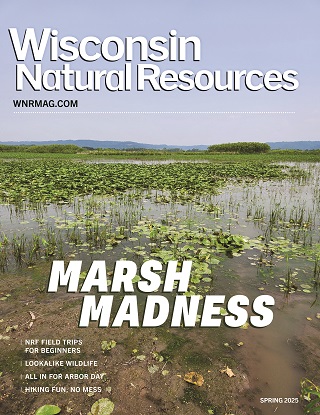Contact: Tim Holme, DNR Conservation Biologist (Central Sands)
wisconsin.gov or 608-403-6243
Emily Helm, DNR Conservation Biologist (Southern Kettle Moraine)
Emily.Helm@wisconsin.gov or 262-470-0267
Help Pollinators By Collecting Common Wild Milkweed Seedpods
Volunteers Needed In The Central Sands And Southern Kettle Moraine Counties
 The DNR encourages volunteers to harvest seedpods from their property or neighbors’ uncultivated fields from Sept. 1 through Sept. 30.
Photo credit: Wisconsin DNR
The DNR encourages volunteers to harvest seedpods from their property or neighbors’ uncultivated fields from Sept. 1 through Sept. 30.
Photo credit: Wisconsin DNR
WISCONSIN RAPIDS, Wis. – The Wisconsin Department of Natural Resources (DNR) asks nature lovers and landowners in Wood, Portage, Adams, Juneau, Waushara, Marquette, Waukesha, Milwaukee, Walworth, Jefferson and Washington counties to collect wild common milkweed seedpods to help grow habitat for native pollinators on state lands.
The DNR encourages volunteers to harvest seedpods from their property or neighbors’ uncultivated fields (with the property owner’s permission) from Sept. 1 through Sept. 30. The DNR will use collected seeds as part of a monarch habitat restoration project across several State Natural Areas in the Central Sands and Southern Kettle Moraine regions.
“We’re trying to plant local native seeds, including milkweed, in established and new prairies to help pollinators like monarchs and the federally endangered Karner blue butterfly,” said Tim Holme, DNR Conservation Biologist. “Collecting milkweed seeds is a great opportunity for the public to help sustain Wisconsin’s prairies and pollinators for generations to come.”
Why Milkweed Helps North American Pollinators
Wisconsin is the heart of the breeding ground for the eastern migratory population of monarchs, whose population has decreased by 80% over the past 20 years. Fifty-four of the state’s 72 counties are located within the breeding area prioritized for monarch butterfly habitat.
In addition to its importance for monarchs, Wisconsin is a stronghold for the federally endangered rusty patched bumble bee and Karner blue butterfly. It is home to populations of 16 other at-risk pollinator species.
How To Help: Collect, Contain, Deliver
- COLLECT – Harvest mature wild common milkweed seedpods only in the following Central Sands counties: Wood, Portage, Adams, Juneau, Waushara and Marquette, or these Southern Kettle Moraine counties: Waukesha, Milwaukee, Walworth, Jefferson and Washington. Mature pods are brownish-green or grayish-green. If the leaves are dying or falling off, the plant’s pods are likely ready for picking or soon will be. Note: When collecting seedpods, please leave one pod behind for every 10 collected to encourage reseeding the milkweed's local population.
- CONTAIN – Place seed pods in a brown paper bag, feed sack, cloth bag or other breathable bags for donation. Include the following information on the seed bag: the county, address or nearest road, or latitude and longitude coordinates of the collection site and contact information for any DNR follow-up questions.
- DELIVER – Drop off the milkweed seed bags at one of the collection sites listed below. Place the seed bags in the side door of the kiosk or in the designated tote to protect them from the elements. After dropping off seed bags, please contact one of the following DNR staff to let them know.
Drop-Off Sites:
Central Sands Region
Adams, Marathon, Marquette, Portage, Shawano, Waupaca, Waushara and Wood counties
Contact: Tim Holme Timothy.Holme@wisconsin.gov or 608-403-6243
- Friendship Ranger Station, 532. N. Main St., Adams, WI
- Necedah Ranger Station, 400 Birch St., Necedah, WI
- DNR Wisconsin Rapids Service Center, 473 Griffith Ave., Wisconsin Rapids, WI
- Plover DNR Ranger Station 2510 Maple Drive, Plover, WI
- Wisconsin Dells Ranger Station 1242 River Road, Wisconsin Dells, WI
Southern Kettle Moraine
Milwaukee, Jefferson, Walworth and Waukesha counties
Contact: Emily Helm Emily.Helm@wisconsin.gov or 262-470-0267
- Havenwoods State Forest, 6141 N. Hopkins St., Milwaukee, WI
- Kettle Moraine State Forest Southern Unit Headquarters, S91W39091 WI-59, Eagle, WI
*Note: Hausmann Nature Center has been removed from this list as it is no longer a part of the program.

